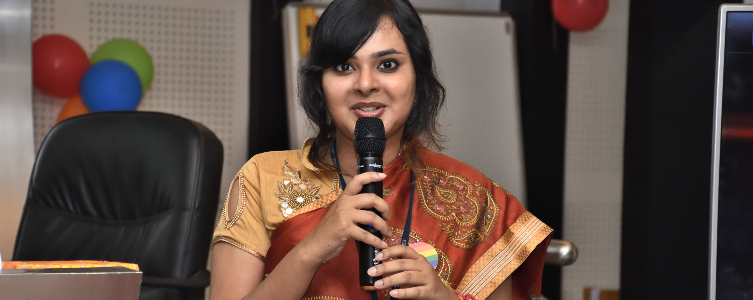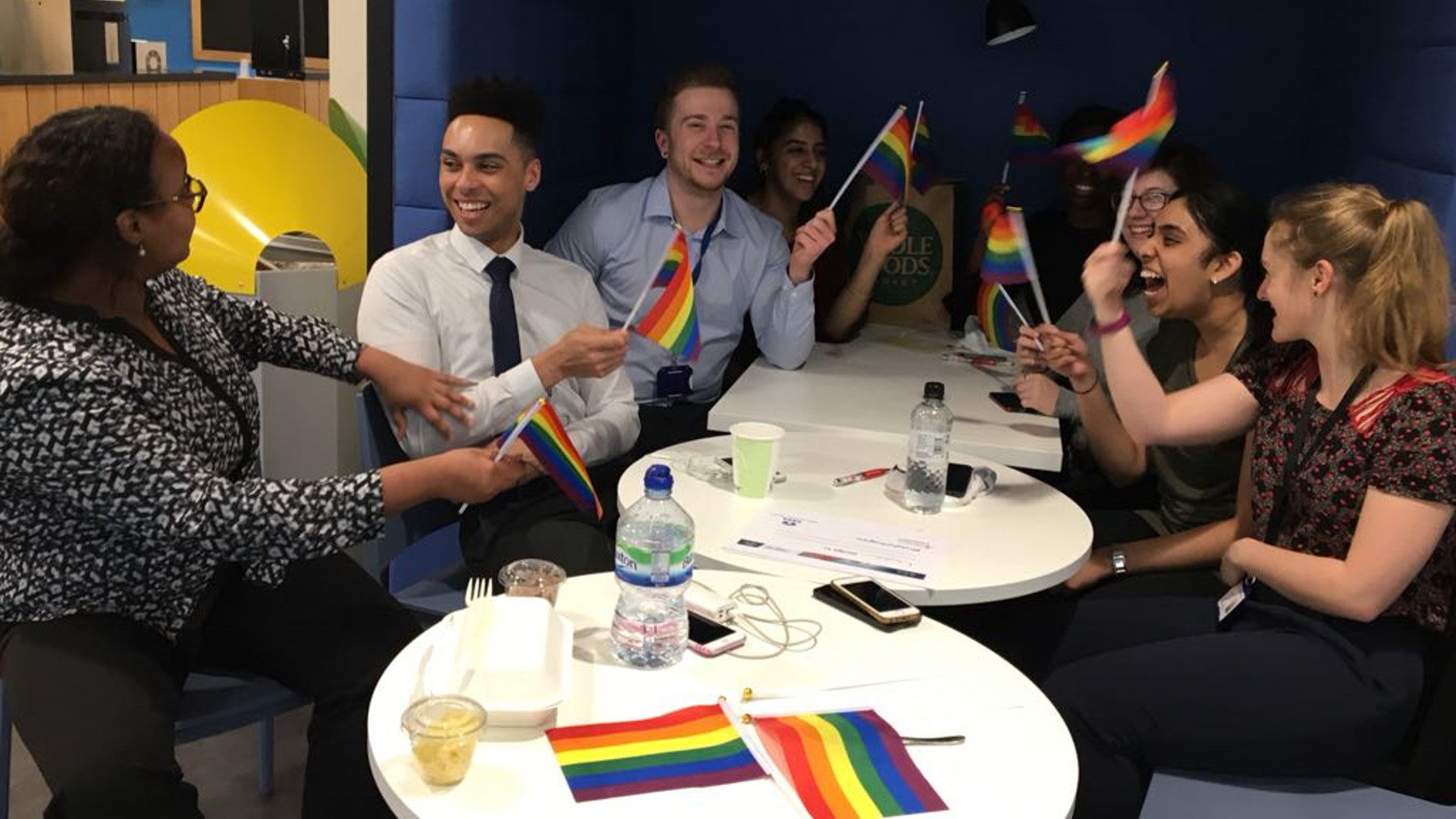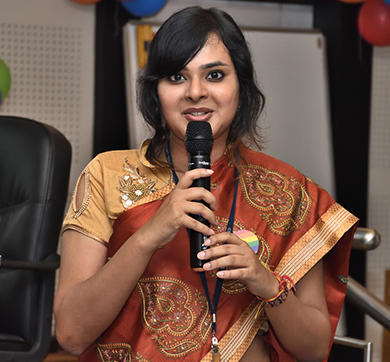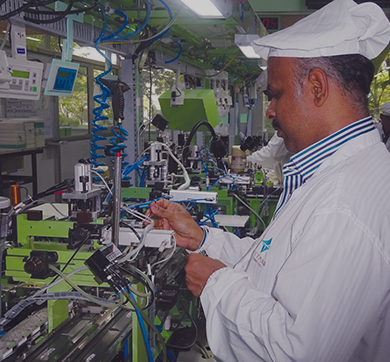December 2018 | 1700 words | 6-minute read
“There was a feeling of incompleteness, of having something wrong with my body, of being unable to connect with my soul. My urge to become a woman grew stronger inside me.”
Thanishka had plenty to be happy about when she was recruited as a trainee by Tata Consultancy Services in 2011, on the cusp of a promising career. The only problem — one that had plagued her childhood and young adulthood — was that she was known to the world as Suresh.
Six years later, with full support from the management at TCS, Thanishka fulfilled her lifelong dream and transitioned into a woman. “I was introduced to the Diversity & Inclusion (D&I) team to help with the change. They conducted several rounds of orientations with my immediate supervisor, managers and the rest of the team to help them acknowledge and accept the changes in my appearance and attire,” says Thanishka. Discussions with the in-house counsellor also helped her make a smooth transition and set expectations regarding people’s reactions.

As it turns out, she needn’t have worried. “The response that I received at TCS was spectacular,” she says. “Both men and women at TCS acknowledged the change in me and reinforced my right to be myself. Women colleagues praised my clothes and makeup. Male colleagues created a supportive and safe work environment. Today, my life is beautiful.”
A transition to tolerance
The D&I team at TCS kickstarted efforts to integrate transgender employees in 2014, following the Supreme Court judgement, which recognised transgenders as the third gender and mandated inclusion of the community across sectors.
These efforts came naturally to an organisation like TCS. “As with all Tata companies, TCS’s employment policies have enshrined in them a commitment to respect the uniqueness of each individual employee, and the freedom from being discriminated against for one’s religion, age, gender, ethnicity, race, and physical and mental ability,” says Sheetal Rajani, Head, Diversity & Inclusion, TCS. “As such, our policies have always been gender agnostic, even extending to our prevention of sexual harassment (POSH) policy.”
Some of the measures adopted by the D&I team included setting up processes with POSH and ethics committees to deal with LGBTQ+ (lesbian, gay, bisexual, transgender, queer+) identity-based bullying and sexual harassment; intranet communication to encourage LGBTQ+ employees to connect with the D&I team for questions or suggestions; conversations with the larger transgender community to promote LGBTQ+ inclusion in the workplace; discussions to set up gender-neutral bathrooms; and establishing dress codes that permitted transpersons to wear attire aligned with the gender of their choice.
Additionally, TCS partnered with Humsafar Trust, a Mumbai-based NGO, that has been defending LGBTQ+ rights since 1994, to share details of job vacancies at TCS so these could be passed on to their network. However, Humsafar’s most significant contribution was working with TCS to conduct formal sensitisation sessions for HR and business leaders.
Sensitivity training
“When I wanted to transition into a woman, the biggest hurdle was ignorance,” says Anubhuti Banerjee, Analyst (Data Science) – Advanced Analytics (Marketing & Sales), Tata Steel, who took the leap soon after the Supreme Court decision in 2014. “Most of my colleagues had very little idea about LGBTQ+ issues. Neither did any of the company policies mention them. However, the company’s diversity initiative was doing fantastic work, and our chief diversity officer’s empathy and understanding of what I needed reassured me that I could officially come out.”

What ensured that Anubhuti’s transition would be effortless, was the diversity team’s initiative to sensitise other members of the organisation regarding what she was going through and what reaction was appropriate and expected of them. “Everyone, especially women, seemed to understand and appreciate the change.”
“Sensitisation programmes go a long way in promoting an intrinsic culture of diversity and inclusion within an organisation,” says Sheetal. “At TCS, apart from training teams on being respectful towards all employees and following a no-discrimination policy, we were focused on building a culture of gender intelligence, and what inclusion really means.”
Getting personal
The D&I team at TCS, Sheetal says, noticed that while amending policies and conducting orientations for teams was a start, what truly made an impact was LGBTQ+ employees coming forward to share their stories.
“Storytelling is one of the most effective tools. When LGBTQ+ employees willingly discussed the ups and downs in their journey, it resonated with other employees,” says Sheetal. “It also promoted communication at work, while building an environment where other LGBTQ+ employees feel comfortable enough to volunteer to share their stories with their colleagues and with leadership.”
An opportunity for storytelling on a large scale, arose in June 2018 (Pride month), when 150 members of TCS’s LGBTQ+ Allies network joined a pan-India meeting, along with the UK and the Philippines on a video conference. “Because we’ve named the network to include “Allies”, it encourages non-LGBTQ+ employees who are champions of the cause, to join the conversation, as well as brings forth those LGBTQ+ employees who may not be ready to come out,” says Sheetal. “Conversations and discussions in these network meetings are confidential and make it a safe space for employees who have concerns or questions. This ecosystem has proven to be so effective that 13 people came out with their stories in the last meeting.”

Among them was Shahbaz Mustafa, a team lead at TCS since 2016, who identifies as gay. “I was invited to share my story in the video conference to celebrate Pride month and was proud to interact with TCSers from diverse geographies and backgrounds,” he says, adding, “Sharing my story with them, and listening to theirs, was a learning experience.”
Safe networking
TCS’s LGBTQ+ Allies network, called Qolors, was launched in March 2018, and is made up of committed LGBTQ+ employees and their allies who help build a safe, inclusive, respectful work environment for lesbian, gay, bisexual, transgender employees and to attract and retain LGBTQ+ talent.
Soon after Shahbaz joined TCS, he was invited by the D&I team to participate in a meeting to discuss creating the LGBT and Allies network. “What a difference such a network makes!” says Shahbaz, who acknowledges that acceptance has not always come easily. “Suddenly, I experienced the power of the collective — all the TCSers who were part of the LGBTQ+ community, as well as colleagues who were proud to be their allies. Giving us a platform to share our stories and experiences, our joys and sorrows made us realise that the organisation truly believes in inclusion and respect for the individual. By inspiring us to come out and disclose our authentic selves to the world, TCS was encouraging us to lead our lives with self-respect and dignity.”
Tata Steel’s D&I initiative MOSAIC, established in 2015, had also been very active. “MOSAIC gave me the opportunity to have the discussions I needed, that one needs when they’re in that state of questioning,” says Anubhuti. But she knew more could be done.
In May 2018, Tata Steel launched MOSAIC Wings, its employee resource group (ERG) for the LGBTQ+ community. The event started with a panel discussion on ‘Inclusion of LGBTs in the workplace’ and concluded with 70 employees signing up to be LGBTQ+ allies. “The first few months after coming out were a rollercoaster experience for me,” says Anubhuti, adding, “Being called ‘madam’ and being free to express myself was worth it! But the day we launched Wings was the most emotional day of my life. The response has been phenomenal.” Today, Anubhuti leads the MOSAIC Wings initiative for Tata Steel.
Beyond the workplace
Leading LGBTQ+ initiatives at Tata Steel have demonstrated to Anubhuti that sensitisation programmes need to venture out of offices and extend to communities as well. “Through publications in vernacular languages and partnerships with educational institutions, we need to put out the message that coming out or being who you are will not compromise your career or future.”
Citing her own journey, Anubhuti states that knowledge of the Tata group’s values was a pivotal factor in signing up with Tata Steel. “The Tata group had always been a step ahead when it came to employee welfare and upholding personal dignity and respect of every individual employee. Thus, the company had already laid the groundwork to building an inclusive work culture.”
This is crucial if a company wants to attract young talent; Anubhuti shares that Tata Steel has encountered potential employees who have disclosed that joining the company depends on the degree to which policies protect LGBTQ+ employees.
The post-377 era
While measures have existed at TCS and Tata Steel to protect LGBTQ+ employees, the Supreme Court’s decision to strike down colonial-era Section 377, thus legalising gay sex, has brought fresh momentum to the movement.
“If there were LGBTQ+ employees who had a figment of a doubt about whether it would be safe to come forward before Article 377 was decriminalised on September 6, that has changed,” says Sheetal, adding that TCS will initiate efforts to further integrate LGBTQ+ members via mentoring, a buddy system, inclusion councils, employee networks and personal development programmes.
At Tata Steel, there are plans in the pipeline to amend certain policies, include those for POSH to better protect LGBTQ+ rights. But while Anubhuti believes great strides are being made, there is still a long way to go in the journey of total acceptance at the workplace — a sentiment that is seconded by Sheetal.
“TCS’s global reach has made it easier to incorporate protection for LGBTQ+ employees as part of its policy. Since there are existing laws in countries where TCS operates, there is already a culture of LGBTQ+ protection,” says Sheetal, adding, “However, we are also a company of 400,000 people, from various backgrounds, sometimes from the remotest places in India, with little or no exposure to people from the LGBTQ+ community. Hence, there are cultural and religious barriers that must be overcome, and some people may be slower to accept that which they don’t understand. We’ve made great progress so far, but there is still work to be done.
—Anuradha Anupkumar








